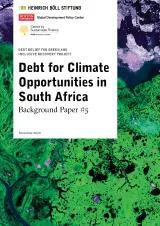The pace of energy transitions in middle-income countries such as China, India, and Indonesia will determine whether the world meets its Paris Agreement target of limiting temperature rise to «well below two degrees». This South African case, which is based on
Meridian Economics’ Just Transition Transaction concept (Meridian Economics, 2020),
suggests that Debt-for-Climate Initiatives (DCIs) are likely to play a valuable role in enabling
and supporting a just transition by contributing towards overcoming political, institutional,
and other barriers in such countries.
The paper proceeds by setting out pertinent aspects of the South African context and the
key role of its electricity sector in contributing to the country’s worsening debt profile. That
an ambitious renewable energy build programme is the most attractive techno-economic
trajectory for the sector going forward – with significant social benefits – is argued on the
basis of system modelling. However, significant political, institutional, and regulatory
barriers still remain for South Africa as it embarks on this path, regardless of pace.
» More about the „Debt Relief for Green and Inclusive Recovery“ initative
Product details
Table of contents
Abbreviations
Short Summary
Executive Summary
1. Introduction
2. South Africa in 2020, Post Covid-19
3. A Transition to Renewable Energy: The Most Attractive Techno-economic Option
4. Institutional, Political, and Regulatory Barriers
5. The Role of Debt-for-Climate Intitiatives to Support a Just Transition in South Africa
6. How Would a DCI Support the Just Transition?
7. Insights from the South Afrinca Case and Issues for Further Exploration
8. Conclusion
References
Author's. Bio
